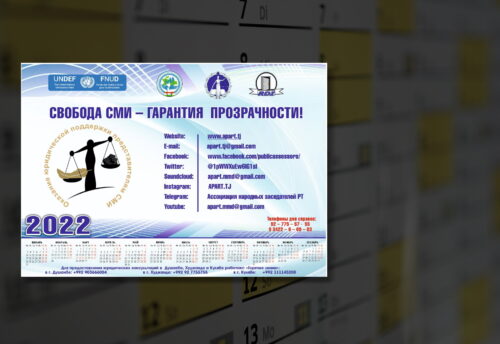Literally over the past few years, media and information literacy in Tajikistan has turned from an incomprehensible term and knowledge used by individual specialists into a trend for civil society, journalists and students. Media literacy popularizers are currently working in different regions of the country, dozens of projects on this topic are being implemented, Media Literacy Houses have been opened in Khujand and Khorog, a textbook in Tajik on this subject has been released, and teachers of local universities are introducing special courses on media and digital literacy.
The “New Reporter” talks about how this direction is developing in Tajikistan.
Teachers of Dushanbe universities who work with future journalists say that the term “media literacy” appeared in their everyday use only two or three years ago.
— I think that there has been a lot of talk about media literacy in Tajikistan since 2018, since the beginning of the MediaCAMP program (the Central Asian MediaCAMP program is implemented by Internews with the support of USAID – editor’s note), – says a lecturer at the Russian-Tajik (Slavic) University (RTSU) Shahodat Saibnazarova. – Then teachers and journalists began to be invited to trainings, in 2018 we took part in the Central Asian Eduton in the capital of Kazakhstan, returned and began to talk about media and digital literacy to journalism students during related special courses.
Now Shakhodat is considered one of the most important inspirers of the development of media and digital literacy in Tajikistan. Three years ago, with a team of journalists, she founded the first Factcheck platform.tj conducts trainings, participates in the development of manuals and textbooks for teachers and students and hopes that in the future media literacy will appear in the program of universities in Tajikistan.
— This year we have applied within our university for the introduction of digital law into the program, which is closely related to digital literacy, we hope that this idea will be approved and a new special course will appear at our Faculty of Russian Philology, Journalism and Media Technologies, – says Shakhodat.
So far, no educational institution in Tajikistan has a separate subject on media literacy, but the number of universities where teachers develop this direction in one way or another is growing.
– Over the past couple of years, media literacy has appeared in eight universities of the republic in Dushanbe, Khujand, Khorog, Kulyab and Bokhtar. Basically, this subject is included in classes for future journalists. For example, one of Internews’ key partners in the development of this field, Ilkhom Jamolien, a lecturer at the Department of Journalism and Translation Theory at Khujand State University, conducted an elective for fourth-year journalism students,” says Alexandra Karimova, a specialist in media and digital literacy at Internews in Tajikistan.
Textbook on media literacy
To help teachers this year, Internews has prepared and released an adapted textbook on media and information literacy in Tajik for students of local universities. The publication includes 19 modules and three chapters, where real examples from the media space of Tajikistan are considered.
– So far we have released only 50 printed copies of the new manual, 32 books have been distributed to partners in different universities of the country. We started with universities where there are faculties or departments of journalism, but we plan to establish cooperation – for example, with a pedagogical university, because the skills of media and information literacy are very necessary for future teachers. After all, in the conditions of the modern world, a school should give students not just a set of established knowledge, but also teach them to navigate in the information space,” says Alexandra.
In addition to the printed version, the electronic format of the textbook is also being prepared for publication. According to Alexandra, it is the electronic version that will be updated and supplemented with new modules over time. For example, Rano Bobojonien, Doctor of Philology, professor, who worked on the adaptation of the textbook on media literacy, is now developing a new module “Conspiracy Theories”, which will also be included in the electronic version.
— To prepare my module, I considered work in this direction through UNESCO, OSCE, Internews in Ukraine and many others, – says Rano Bobojien. – Conducted an analysis of our local media and identified conspiracy theories that exist in the media space of Tajikistan. For example, in our country, as in other countries, conspiracy theories related to COVID-19 are popular – calls to refuse vaccination, the opinion that the pandemic is the result of the work of large commercial companies, etc. In the module, I explain how conspiracy theories spread, and show it with real examples.
For the past three years, Early Bobojonien has been conducting introductory sessions for her students, and since mid-October 2021 she has been working with a new textbook and is now teaching media literacy to undergraduates during a special course on web journalism.
The development of media and information literacy is also supported in Tajikistan by major international organizations. For example, with the support of the OSCE, a working group operates on the basis of the Ministry of Education and Science, which includes representatives of this department, university professors, as well as representatives of Internews in Tajikistan. Specialists are working on updating the standard of education at journalism faculties. In accordance with it, media literacy will be included in the program for students of journalism faculties.
— In the era of digitalization and oversaturation of information, it is extremely important to be able to filter and effectively use the information received. In order to further support Tajikistan in addressing these issues, the OSCE Program Office in Dushanbe promotes the evaluation of the curriculum of journalism faculties of state universities in order to bring it in line with internationally recognized standards and meet the needs of young people: journalism students, teenagers, as well as local media. In this regard, our organization supports Tajikistan’s efforts to improve the level of media and digital literacy, providing further assistance to the country in carrying out educational reforms,” says Michal Pravdzik, Media Officer of the Human Dimension Department of the OSCE Program Office in Dushanbe.
As for the plans of Internews in Tajikistan regarding the development of media and digital literacy, all the work started in this direction under the MediaCAMP program will continue next year. For example, in the first half of 2022, the traditional regional online Eduton will take place – an innovative seminar of an applied nature aimed at obtaining new knowledge, exchanging experience and developing projects for the dissemination of media and digital literacy with the help of experienced mentors. Also, a large Central Asian conference is planned for 2022, which will bring together the best industry specialists in the region, grant competitions for the creation of thematic projects will be held, and the third Media Literacy House will open in Dushanbe.
The information is taken from the website www.nansmit.tj .




Leave a Reply